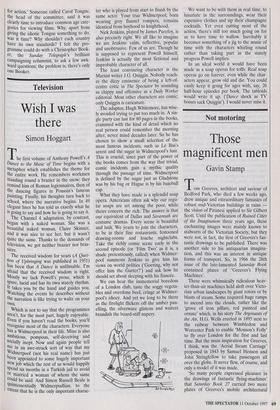Television
Wish I was there
Simon Hoggart
The first volume of Anthony Powell's A Dance to the Music of Time begins with a metaphor which establishes the theme for the entire work. He remembers workmen standing round a brazier in the snow; they remind him of Roman legionnaires, then of the dancing figures in Poussin's famous Painting. Finally, his thoughts turn back to school, where the narrative begins. In 49 elegant lines he has told us exactly what he Is going to say and how he is going to say it. The Channel 4 adaptation, by contrast, began with a naked woman. She was a beautiful naked woman, Claire Skinner, and it was nice to see her, but it wasn't quite the same. Thanks to the demands of television, we got neither brazier nor bras- siere.
. The received wisdom for years (A Ques- 11,0n of Upbringing was published in 1951) has been that A Dance is unfilmable. I'm afraid that the received wisdom is right. Mostly we lack Powell's prose, which is spare, lucid and has its own stately rhythm. It takes you by the hand and guides you. Watching the events he describes without the narration is like trying to waltz on your own, Which is not to say that the programmes aren't, for the most part, hugely enjoyable. Even if you haven't read the books, you'll recognise most of the characters. Everyone has a Widmerpool in their life. Mine is also ambitious, pompous, self-deceiving and socially inept. Now and again people tell me in an awe-struck sort of way that my Widmerpool (not his real name) has just been appointed to some hugely important new job which the rest of us would happily spend six months in a Turkish jail to avoid Or married a woman of whom the same eoUld be said. And Simon Russell Beale is quintessentially Widmerpudlian, to the extent that he is the only important charac- ter who is played from start to finish by the same actor. Your true Widmerpool, born wearing grey flannel rompers, remains identical from boyhood to knighthood.
Nick Jenkins, played by James Purefoy, is also precisely right. We all like to imagine we are Jenkins: calm, reflective, popular and unobtrusive. Few of us are. Though he is supposed to represent Powell himself, Jenkins is actually the most fictional and improbable character of all. The least convincing character is the Marxist writer J.G. Quiggin. Nobody reach- es the dizzy eminence of being a left-of- centre critic in The Spectator by sounding as chippy and offensive as a Daily Worker editorial. Most other characters are comic; only Quiggin is caricature.
The adaptor, Hugh Whitemore, has wise- ly avoided trying to put too much in. A sin- gle party can last for 80 pages in the books, crammed with the kind of detail which no real person could remember the morning after, never mind decades later. So he has chosen to show a small selection of the most famous incidents, such as Le Bas's arrest and the sugar in Widmerpool's hair. This is crucial, since part of the power of the books comes from the way that trivial, comic incidents gain a mythic quality through the passage of time. Widmerpool is defined by the sugar just as Gladstone was by his bag or Hague is by his baseball cap.
What they have made is a splendid soap opera. Americans often ask why our regu- lar soaps are set among the poor, while theirs concern the rich. The answer is that our equivalent of Dallas and Savannah are costume dramas. Every scene is beautiful and lush. We yearn to join the characters, to be in their fine restaurants, festooned drawing-rooms and louche nightclubs. Take the richly comic scene early in the second episode (or 'Film Two' as it is, a shade pretentiously, called) when Widmer- pool summons Jenkins to give him his views on world politics ('Goering, why not offer him the Garter?') and ask how he should set about sleeping with his fiancée.
We can hear the inunemorial boredom of a London club, taste the soggy vegeta- bles and overdone beef, cringe at Widmer- pool's idiocy. And yet we long to be there as the firelight flickers off the umber pan- elling, the silverware glistens and waiters brandish the board-stiff napery. We want to be with them in real time, to luxuriate in the surroundings, wear their expensive clothes and sip their champagne cocktails. Yet even cutting most of the action, there's still too much going on for us to have time to wallow. Inevitably it becomes something of a jig to the music of time with the characters whirling round rather than taking part in the stately progress Powell implies.
In an ideal world it would have been made as a soap operas for toffs. Real soap operas go on forever, even while the char- acters appear, grow old and die. You could easily keep it going for ages with, say, 26 half-hour episodes per book. The tabloids would write it up. (Dance shock as TV bosses sack Quiggin'). I would never miss it.


















































































 Previous page
Previous page